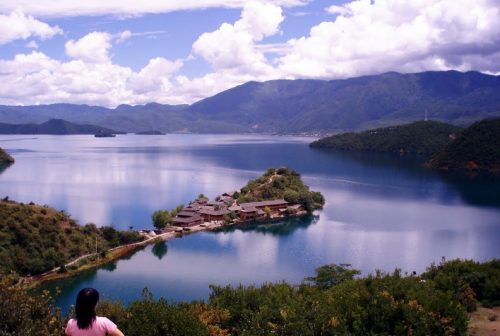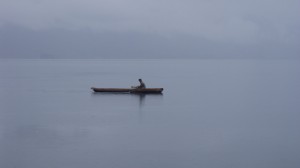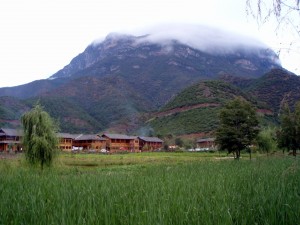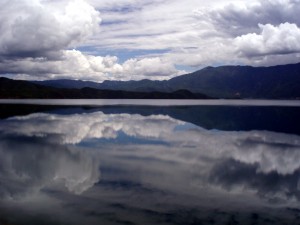Lugu Hu (Lake).
Brian Hennessy. An Australian in China. 2007
Lugu Hu is a remote lake straddling the Sichuan-Yunnan border in southwest China. Perched at 2685m above sea-level, the area around this wonder of nature is home for 36,000 Mosuo people, whose culture emerged long ago from Tibetan and Naxi influences.
Lugu Hu (lake)
______________________________________________________________
This ancient matriarchal society is famous for one of its more fascinating elements: the concept of “walking marriage”. A different template for relationships between the sexes, for raising children, and for transmitting culture. A complex system of mating and responsibility that works well in this small society living in splendid isolation around the beaches, bays, and small peninsulas of one of the most beautiful lakes in the world.
Remember this name: Lugu Hu. If you are within striking distance of south Sichuan or northwest Yunnan provinces, go there. The journey by road (no other means) either from Xichang in south Sichuan, or Lijiang in Yunnan will introduce you to some stunning mountain scenery.
I travelled from Lijiang: down from the high country in one steep series of switchbacks to the Jinshajiang (the upper reaches of the Yangtze River) below, across sturdy bridges spanning this yellow torrent, and along a narrow snaking road glued to the steep valley walls. Walls which had partially collapsed here and there as a result of the heaviest rain in 100 years. Landslides were a problem. To end up in the Jinshajiang here in Yunnan would mean having my body fished out of the water offshore from Shanghai a week or so later. Only one way to go folks…down and out!
But the scenery! The scenery! This river, these mountains, and this countryside. And the folk who live here. This is their world and their reality. The river is their history. This river gave birth to and nurtured the development of several new societies which thrived here so long ago. This is where they find the bones, the broken clay pots, the tools, the weapons, and the crude figurines of their ancestors. Along the banks, inside the caves up there on the cliff-face, or buried in peat along the narrow strips of floodplain supporting a dry-season crop of corn, buckwheat, and vegetables. The beginnings of a settled, agricultural society. The beginning of culture.
The road claws rather than climbs its way out of the Jinshajiang valley and up to the red earth and green hills of Yi minority territory on a plateau above. A pleasant journey through a farmland of subsistence agriculture dotted with small, poor, and depressed Yi villages.
The county town of Ninglang offering evidence of more progressive society with its Chinese hotels, restaurants, and advertising. That, and the incessant beeping of impatient horns from a little traffic on a few wide open streets. Mute, staring, pedestrians materialise from nowhere to gape and gawk in silent wonder at any inconsequential interruption to their day.
For example; the sight of a 4-wheel-drive vehicle enroute from somewhere far away to somewhere else even further away, the arrival of a scheduled bus, or better still – the arrival of a foreigner (laowai) in town. Introduce a foreign difference to a local monotony, and suddenly life is rich in experience. A lowai in town today, means something to talk about tonight.
A suggestion: Smile and say ‘ni hao’. Be patient and wait for the delayed response. Wait for your friendly gesture to register – sometimes four or five seconds – and be rewarded by by the result. A shy smile, a beam of teeth, a chatter of wonder. These folk, although curious, are often frightened to make the first move. Try the children first, then the grandparents, and then the folks in the middle. It’s worth the effort. Don’t be frightened by their blank faces: it is they who are frightened of you!
The gradual climb out of Ninglang towards Lugu Hu allows time to ponder history. In the 13th century, Khublai Khan and his Mongol army marched through here on their way to conquer Yunnan province. But in order to do this, they first had to deal with the powerful Bai kingdom based around Dali on another lake further south, Erhai Hu. And deal with it they did.
Joseph Rock, the famous botanist and explorer also knew this area intimately. He was a friend of the Tibetan king of Muli, an isolated ancient theocracy located in a mountainous, gorge ridden, region further to the north. This area was surrounded by bandit tribes, and Rock needed armed protection as he passed through here on his northern expeditions. Protection usually provided by the local warlord. Both the King and Rock himself were great negotiators, and this is how they survived – by doing deals with the devil! Bandits and warlords. Ah, so many stories. One short journey, yet so many stories.
My first view of Lugu Hu is from the rim of the encasing range. It is breathtaking in its beauty. And so is the view further down at water-level from the Mosuo village of Luoshui. It is late afternoon, and the light grey surface of the lake blurs into a darker leaden sky halfway across this calm and beautiful body of water.
No horizon in the distance. No visual separation of water and sky as a dull quietness settles over this peaceful valley of water, and still reflections blend with a darkening, falling sky. In the foreground, a man rowing a canoe from one side of the lake to another, his boat leaving no wake, no trail, no evidence that he has passed this way.
A blanket of mist covering everything as the day dims and the evening lights of Luoshui and other lakeside villages add their magic to this special place.
Morning brings another surprise. The cool glow of dawn revealing a different Lugu Hu from yesterday. Dull white clouds are hugging the sides of Mount Gemu, the tallest peak in the area, and the countryside below is green. Cornstalk green. And here and there, disciplined plots of sunflowers add their happy yellow faces to the scenery.
An occasional zephyr of early morning convection ruffles patches of the soft glassy blue marine as low cotton clouds developing around the ridges of this basin smudge the sky with a brilliant white. The deep purple of the evening firmament now fading into a clear blue sunny day. Water and sky merging again – this time in a brilliant Rorschak of white and blue.
A mature woman and a young girl doing the washing in cool clear water on the edge of the lake beside a mottled brown and grey pebbled beach. A gnarled old Casuarina tree providing shade from the sharp rays of a mountain sun, as they soap, rub, and wash the fertile red soil out of the blues, reds, and whites of traditional Mosuo clothing.
Mother and daughter? Aunt and neice? Elder sister and younger sister? It doesn’t matter. The children here are the collective responsibility of all women, and they enjoy a peaceful life in a place where paternity is not such a big deal.
Let the men paddle their canoes and worry about politics while the women look after everything else.




